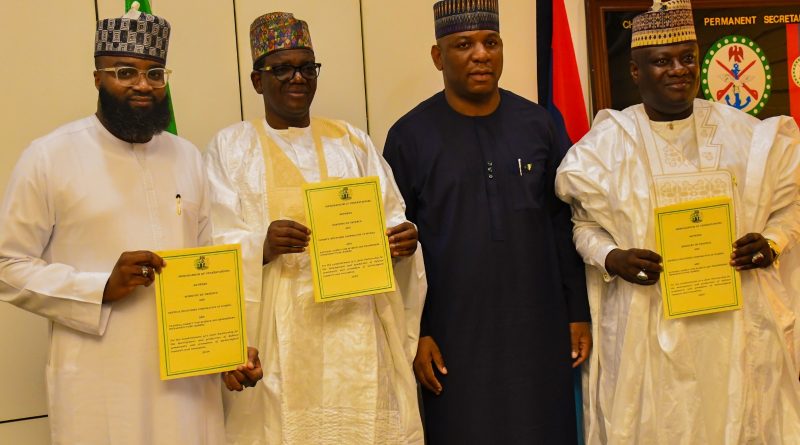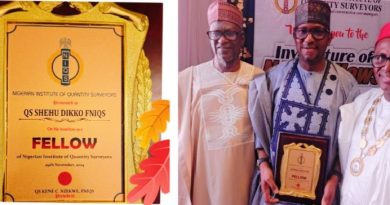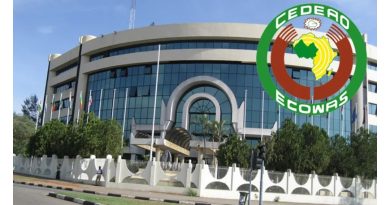Nigeria’s Path to Self-Reliance in Defence Production: MoD. DICON, NASENI Sign Landmark MoU
“The MoU signing ceremony was a testament to our collective commitment to strengthening Nigeria’s defence infrastructure through indigenous innovation and technological advancement. I was impressed by the Executive Vice Chairman of NASENI, Mr. Khalil Suleiman Halilu’s emphasis on the importance of the Military Industrial Complex (MIC) as a national imperative.
“Mr. Halilu’s words resonated with me, as we both recognize the urgency of positioning Nigeria to address emerging threats with homegrown solutions. The rapidly evolving global security environment demands that we prioritize self-reliance in defence production.
On his part the This partnership will facilitate the establishment of Nigeria’s Ammunition Production Factory, a project that will not only enhance our defence capabilities but also contribute to the country’s economic growth. I am confident that this collaboration will yield remarkable results, showcasing Nigeria’s potential for indigenous innovation and technological advancement.
As we move forward, I am committed to ensuring that our ministry provides the necessary support to NASENI and the Defence Industries Corporation of Nigeria (DICON) to achieve our shared goals. Together, we will work tirelessly to strengthen Nigeria’s defence infrastructure and secure a brighter future for our nation.
In a significant step towards enhancing Nigeria’s defence capabilities and achieving self-reliance in military hardware production, the National Agency for Science and Engineering Infrastructure (NASENI) today 14th August 2024, signed a Memorandum of Understanding (MoU) with the Ministry of Defence.
This partnership marks a pivotal moment in Nigeria’s quest to strengthen its defence infrastructure through Indigenous innovation and technological advancement.
During the MoU signing ceremony, the Executive Vice Chairman of NASENI, Mr, Khalil Suleiman Halilu highlighted the importance of the Military Industrial Complex (MIC), as not just a strategic initiative but a national imperative.
Khali emphasized that in a rapidly evolving global security environment, it is crucial for Nigeria to position itself to address emerging threats with homegrown solutions.
“Today, we are embarking on a journey that will redefine Nigeria’s defence landscape and secure our nation’s future,” said the NASENI Executive Vice Chairman. “This partnership between NASENI and the Ministry of Defense is a testament to our commitment to harness Nigeria’s scientific and engineering expertise in the service of national defense.”
NASENI’s track record in research, development, and manufacturing positions the agency as a key player in the establishment of the MIC. The new Military Industrial Complex will serve as a hub for the development, production, and maintenance of military equipment, ranging from small arms to advanced defense systems.
The project aims to create a robust ecosystem that supports the needs of the Nigerian Armed Forces while fostering the growth of local industries, thereby reducing reliance on foreign imports.
“This MoU represents the beginning of a long-term collaboration aimed at enhancing our defence capabilities through innovation and indigenous production,” the Executive Vice Chairman continued. “Our goal is to ensure that our military is equipped with the best tools to defend our nation, and through this partnership, we will lay the foundation for a self-reliant defence industry that will also contribute to Nigeria’s economic growth.”
Halilu expressed his deep appreciation to the Honorable Minister of State for Defence, Dr Bello Mohammed Matawalle, MON and the entire Ministry for their unwavering support and confidence in NASENI. “We are ready to work tirelessly to ensure that the vision of a Nigerian Military Industrial Complex becomes a reality. We owe it to our nation, to our Armed Forces, and to the generations yet unborn,” he said.
This MoU signifies the start of a strategic partnership that will elevate Nigeria’s defence capabilities and contribute to the broader goal of national security and economic development.
Other stakeholders present to witness the signing of this landmark agreement included the Minister of Steel Development, Prince Shuaibu Abubakar Audu, Permanent Secretary of the Ministry of Defence, Dr Ibrahim Abubakar Kana, Senior Officers of the Nigerian Armed Forces.




